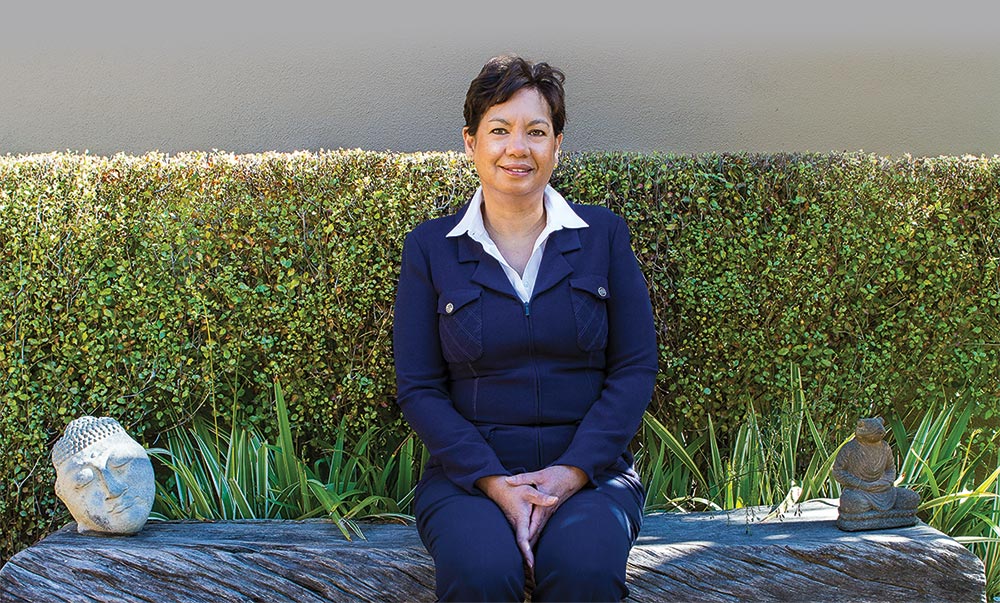
As vice president of the Law School’s chapter of the Black Law Students Association, she worked with other members to arrange the Law School’s first minority recruitment event. Given a modest budget, they bought refreshments and distributed handmade flyers promoting the event to students at local colleges. The successful event eventually grew into part of the Law School’s admissions programs and helped to increase the number of applicants from communities of color.
Today, Denson-Low continues that commitment to higher education as vice chair of the board and chair of the audit committee at RPI, and, with her husband, Ron Low, through her support for scholarships at the Law School for students from underrepresented groups.
“Growing up during the Civil Rights Movement, we were taught by our families that, from elementary school to higher education, things were going to be tough for us,” said Denson-Low. “Not because the work was challenging, but because the circumstances under which we had to learn were challenging. So, we went into institutions of higher learning with our eyes open, knowing that if things were going to change, we had to be the people to change them.”
After her first full-time job out of law school at Union Carbide, where she was one of the first women of color to work as a patent attorney, she joined Hughes Aircraft Company in 1984. Within five years, she was promoted to chief patent counsel, making her the nation’s first woman of color to serve in that role for a Fortune 500 company. In 1992, she became a vice president of the company, again the first woman of color to do so.
Denson-Low moved to Boeing after it acquired Hughes’s Space and Communications division in 2000, serving as its general counsel. There, she held a succession of leadership roles, culminating in her appointment as senior vice president of Boeing’s Office of Internal Governance. In this role, she was responsible for the oversight of the Global Compliance, Internal Audit, Ethics and Business Conduct, and Risk Management departments for what was at the time the largest exporter in the country.
Throughout her career, it has been critical to Denson-Low that she not only look ahead to new challenges, but offer assistance to those who follow her. Early in their careers when their children were young, she and her husband, also an attorney, sacrificed to save money to set up small scholarships through local bar associations to cover book fees. As their careers progressed, the couple expanded their efforts in number and amount, endowing scholarships at RPI and the National Asian Pacific Bar Association in addition to other charitable giving. Denson-Low also mentored a sprawling network of professionals and students in both the legal and STEM fields and used her time and resources to ensure access to education for people of diverse backgrounds.
“People fought and died for us to be able to attend integrated schools and institutions of higher learning,” said Denson-Low. “So, not only did we have a responsibility to attend school, but, once we were able to financially, we felt we had to help others do the same.”
In 2016, Denson-Low and her husband created 10 scholarships to help recruit promising applicants to Brooklyn Law School. The recipients received not only the funds, but also, after meeting with Denson-Low and her husband at a breakfast arranged by the Law School, her mentorship.
“Meeting the students felt like the realization of our dream to help someone,” she said. “We’re still in touch with some of those students today.”
Now in retirement after a trailblazing career, Denson-Low is more committed than ever to increasing access to higher education. This year, she and her husband have contributed to the Law School’s Diversity Initiative by creating four new scholarships to support students from underrepresented groups. Two of those scholarships will continue in perpetuity, laying the foundation for their son, Cameron Low ’19, to continue their legacy. She is also helping to build a pipeline between her two alma maters to encourage more diverse students and students with STEM backgrounds to study law.
“I feel a responsibility to the Law School because I had some modicum of success, and I want to help ensure that students who have the acumen and the talent have that same opportunity,” said Denson-Low. “What I’ve learned through all this engagement is that although I can’t change the past, I can change the future for the students who might come.”